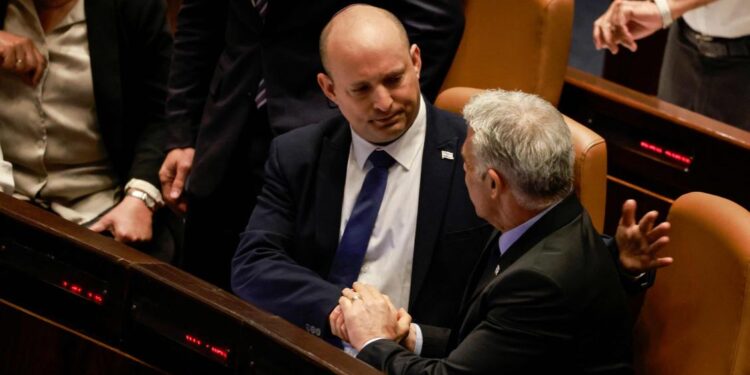Agencies-Gaza post
Israeli parliament dissolved, and elections are set for November 1st
Israeli lawmakers dissolved parliament on Thursday, forcing the country’s fifth election in less than four years, with Foreign Minister Yair Lapid taking over as provisional prime minister at midnight.
The final dissolution bill, passed with 92 votes in favor, none against, ends the one-year presidency of Naftali Bennett, who led an eight-party coalition backed by an Arab party, the first in Israeli history.
After the vote, Lapid and Bennett immediately exchanged seats in parliament – the Knesset – and Lapid was embraced by members of his centrist party Yesh Atid (There is a future).
Bennett said late Wednesday that he will not run in the upcoming elections scheduled for November 1, which will see veteran right-wing opposition leader Benjamin Netanyahu attempting to reclaim power.
Netanyahu has promised that his alliance of right-wing, ultranationalist, and ultra-Orthodox Jewish parties will win the next vote, but opinion polls show that he could also fight for a parliamentary majority.
Bennett will host Lapid for a handover ceremony later Thursday, the prime minister’s office said.
The outgoing premier will also hand over the leadership of his religious-nationalist Yamina party to his longtime political ally, Interior Minister Ayelet Shaked.
Netanyahu’s main challenger will likely be longtime foe Lapid, a former celebrity news host who has surprised many since he was dismissed as a lightweight when he entered politics a decade ago.
Bennett’s motley alliance, formed with Lapid in June 2021, offered a respite from an unprecedented era of political stalemate, ending Netanyahu’s record for 12 consecutive years in power and surpassing Israel’s first state budget since 2018.
When the couple announced plans to end their coalition last week, Lapid sought to view Netanyahu’s potential return to office as a national threat.
“What we need to do today is to return to the concept of Israeli unity. Don’t let the dark forces destroy us from within, ”Lapid said.
Bennett led a coalition of right-wing, centrist, doves, and Islamists of the Raam faction, which made history by becoming the first Arab party to support an Israeli government since the creation of the Jewish state.
But the alliance, united by a desire to oust Netanyahu and break a harmful cycle of inconclusive elections, has been jeopardized from the outset by its ideological divisions.
Bennett said the last straw was the failure to renew a measure that ensures that the approximately 475,000 Jewish settlers in the occupied West Bank live under Israeli law.
Some Arab coalition lawmakers have refused to support a bill that they claimed to mark a de facto endorsement of a 55-year occupation that forced Palestinians in the West Bank to live under Israeli rule.
For Bennett, a staunch supporter of settlements, letting the so-called West Bank law expire was intolerable. The dissolution of parliament before the deadline of 30 June temporarily renews the provision.
In the weeks leading up to the disbandment of his coalition, Bennett sought to highlight its successes, including what he called proof that ideological rivals can rule together.
“Nobody should give up their positions, but it is certainly possible and necessary to put aside ideological debates for a while and take care of the economy, security, and future of Israel’s citizens,” he said in his speech Wednesday. farewell, which did not exclude a possible return to politics.
Bennett will remain as the alternative prime minister in charge of Iranian politics as world powers take steps to revive stalled talks over Tehran’s nuclear program.
Israel opposes the restoration of the 2015 agreement which gave Iran relief from sanctions in exchange for limits on its nuclear program.
Lapid will retain the title of a foreign minister while serving as Israel’s 14th premiere. He will find himself under the microscope, with US President Joe Biden that he should arrive in Jerusalem in two weeks.

















